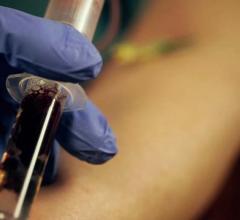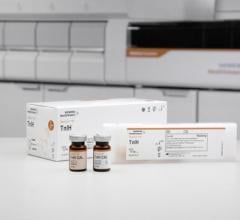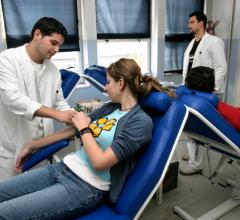March 10, 2014 — Without administering a simple blood test in the first few days after surgery, 85 percent of the heart attacks or injuries patients suffer could be missed, according to a study in the March issue of Anesthesiology. Globally, more than 8 million adults have heart attacks or injuries after surgery every year, and 10 percent of those patients die within 30 days.
The study suggests a new diagnosis, Myocardial Injury after Noncardiac Surgery (MINS), would be useful to physicians because of its broader definition from what is traditionally used to diagnose heart attacks now. The study authors note that by using the traditional definition of heart attack, more than 50 percent of the serious heart attacks or injuries that happen after surgery will go undetected. This could seriously affect a patient’s chances of surviving 30 days past surgery.
The study found that only 15 percent of patients who have heart attacks after surgery experience traditional symptoms such as chest pain and pressure, shortness of breath or pain in the neck, jaw or arm.
“Most surgical patients who suffer a heart attack or injury will do so within the first 48 hours after surgery,” said P.J. Devereaux, M.D., Ph.D., head of cardiology and the Perioperative Cardiovascular Clinical Program at the Juravinski Hospital and Cancer Centre, Hamilton Health Sciences, Hamilton, Ontario, and lead study author. “During this time, most of these patients are typically taking pain medications, which can mask the symptoms of a serious heart injury.”
For the first three days following surgery, more than 15,000 patients older than 45 who were having non-cardiac surgery, had a simple blood test to measure troponin. Patients with an elevated level of troponin were given an EKG to also assess heart damage.
The study found that only 15 percent of patients who suffered heart attacks or injury after surgery experienced chest pain or other heart attack symptoms. Without monitoring troponin concentrations, 85 percent of those who suffered heart attacks or injury would have gone undetected. The study also found that of all the post-surgical complications, heart attack or injury is the most common reason patients die within 30 days of surgery. Ten percent of patients who suffer a heart attack after surgery will die within 30 days.
“The ease and feasibility of the test to detect heart injury point to tremendous opportunities for designing clinical studies to test novel interventions for attenuation of myocardial injury and perioperative mortality,” said Karsten Bartels, assistant professor, department of anesthesiology, University of Colorado School of Medicine, Denver, in an accompanying editorial.
The American Society of Anesthesiologists
For more information: asahq.org


 October 09, 2019
October 09, 2019 









